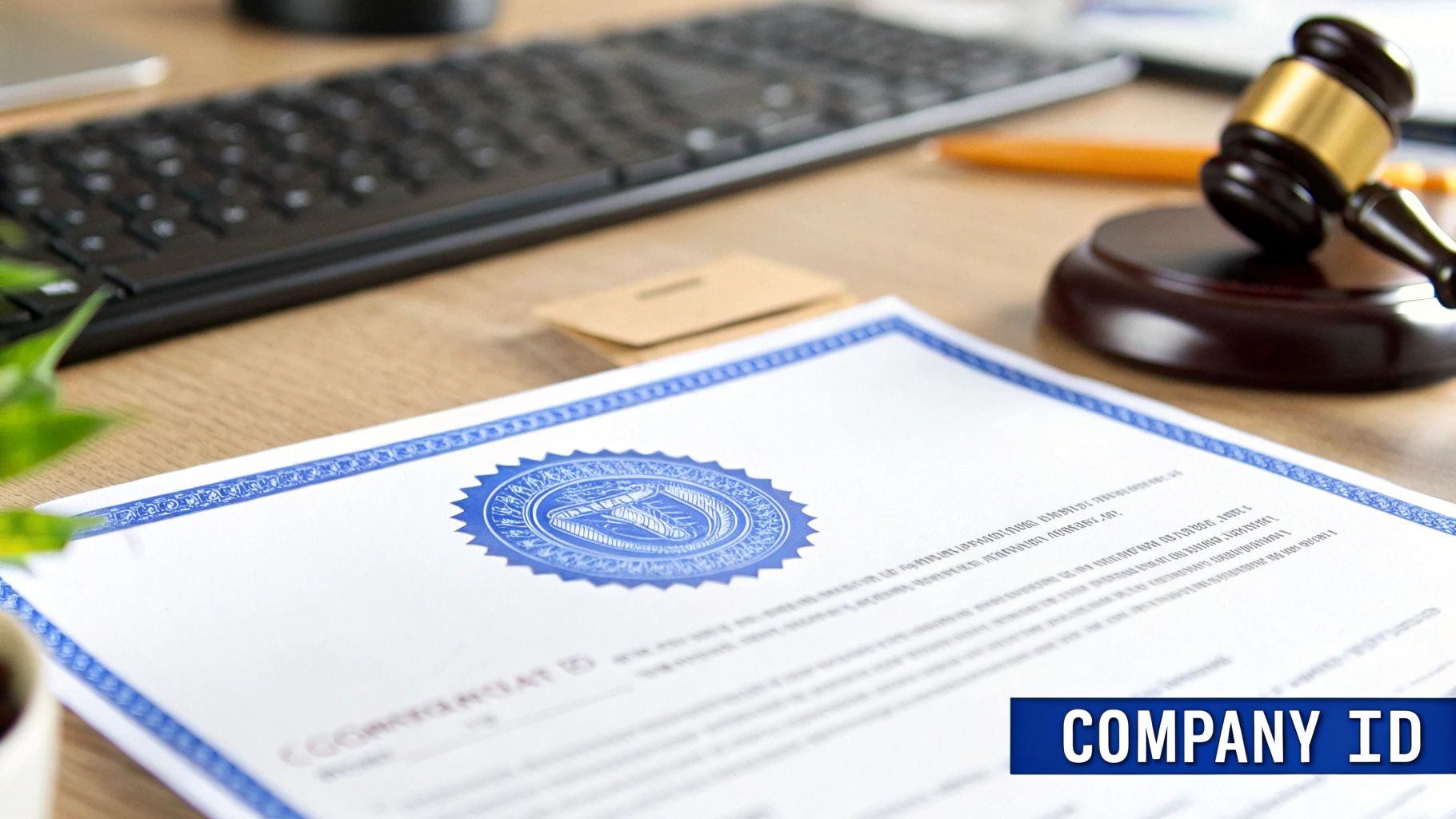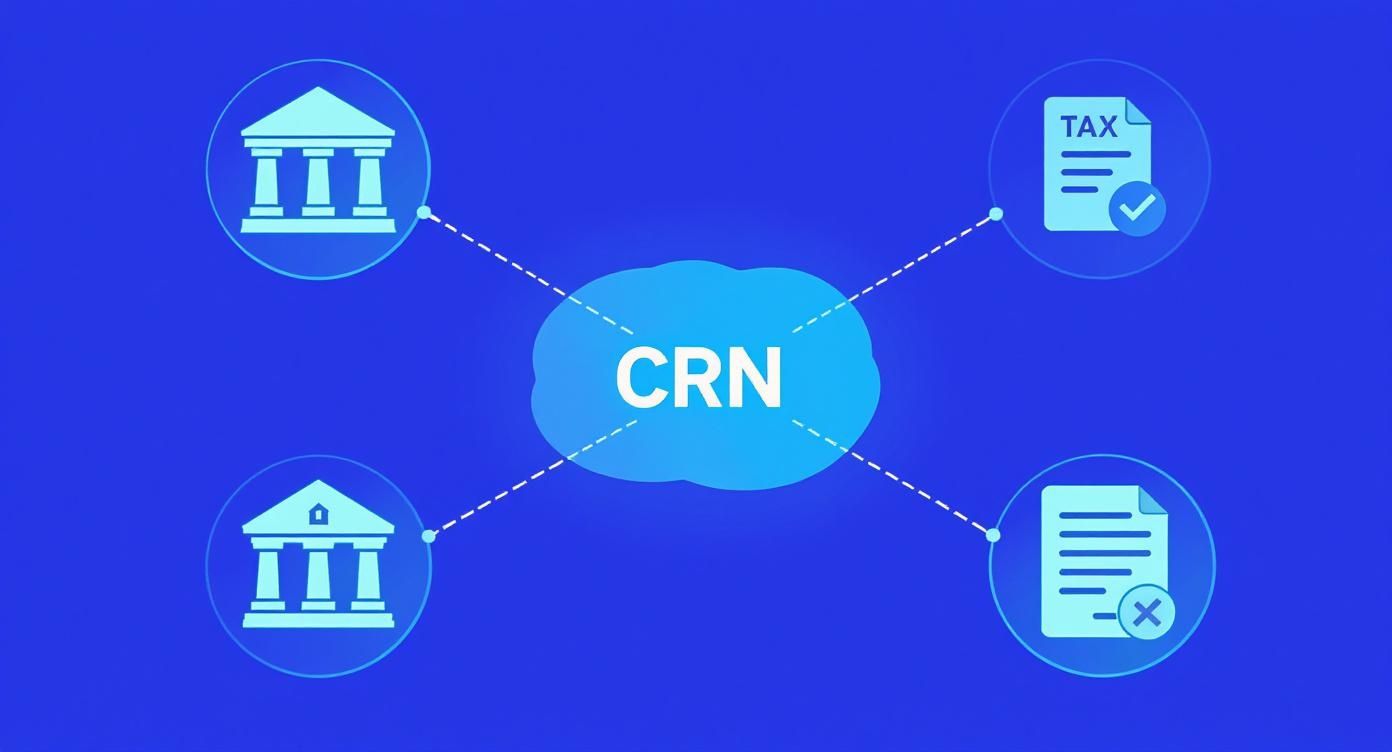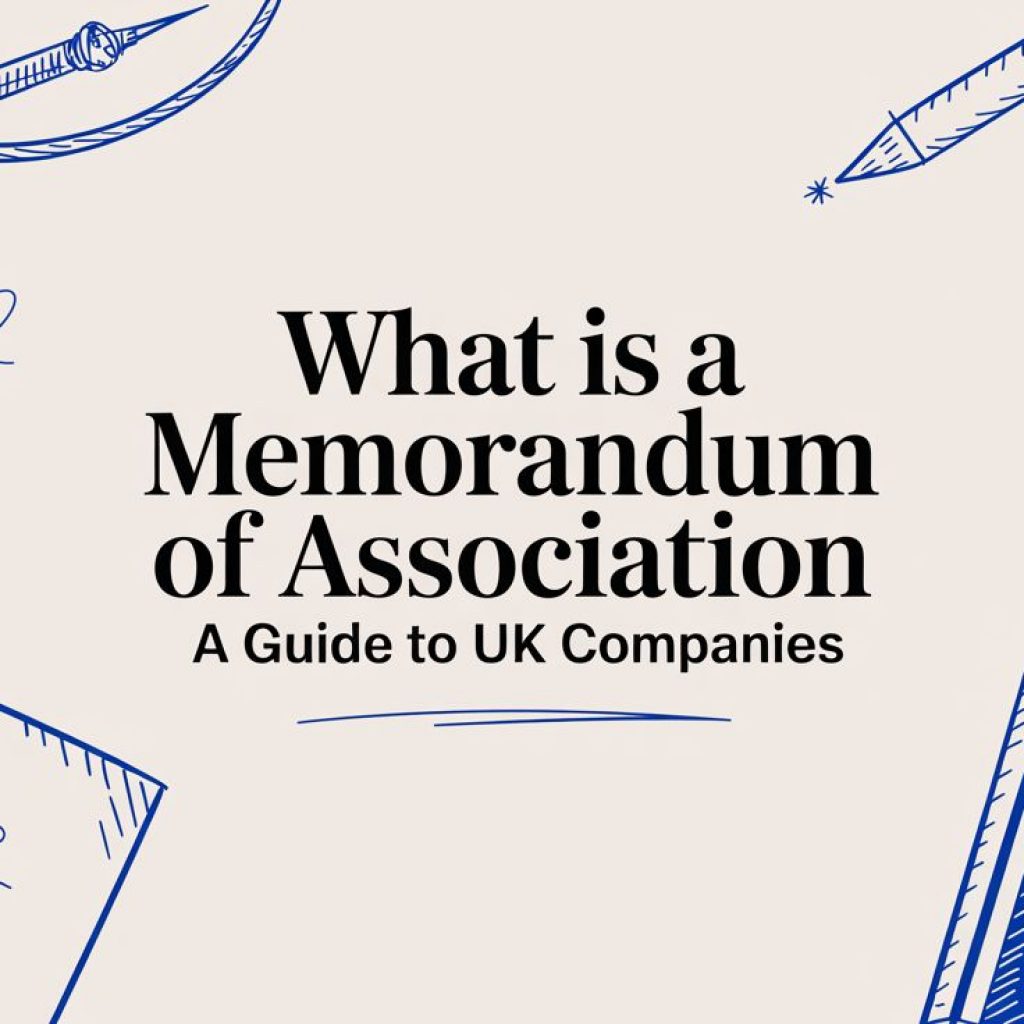What Is the CRN Number in the UK
What is the CRN Number – When you form a limited company in the UK, Companies House assigns it a unique eight-character code. This is your Company Registration Number, or CRN, and it acts as your business’s permanent ID. It’s the official proof that your company legally exists and is recognised by the UK government.
Your Company’s Unique Digital Fingerprint

Think about trying to identify someone just by their name. It’s not very reliable, is it? Plenty of people share the same name. The CRN solves this exact problem for businesses. Just like no two people have the same fingerprint, no two UK limited companies will ever share the same Company Registration Number.
This simple code is the single most dependable way to identify your company. You can change your company name or move your business address, but your CRN is fixed for life. It stays with your business from the moment it’s incorporated until the day it’s dissolved.
The Foundation of Your Business Identity
Every limited company and Limited Liability Partnership (LLP) registered with Companies House gets one of these unique identifiers. This permanence is what makes government, financial, and business transactions run smoothly. The number never changes, even if the company’s name or address does.
This consistency is crucial for maintaining a clear and traceable corporate history, which is essential for legal and financial accountability. For instance, your CRN is directly linked to your company’s official correspondence address, which you can learn more about in our guide on what is a registered office in the UK.
Your CRN is more than just a number; it’s the bedrock of your company’s official identity. It is the key used by banks, government agencies like HMRC, and other businesses to verify that your company is legitimate and in good standing.
Without this number, your business essentially doesn’t exist in the eyes of the law. As we’ll see, this single identifier unlocks everything from opening a bank account and filing taxes to entering into legal contracts.
How to Find Any UK Company’s CRN in Seconds
Whether you need the CRN for your own company or you’re doing a bit of due diligence on another, finding it is refreshingly simple. The official government database is your best port of call, and it’s completely free to use.
The fastest and most reliable place to look is the Companies House online search register. This is the public record of every single limited company and LLP in the UK. Nine times out of ten, you’ll have the CRN you need in just a few clicks.
Using the Companies House Service
The service itself is very user-friendly. You just need to pop over to their website and use the search bar to track down the company in question.
- Type in the Company Name: Start typing the company’s name—a partial name often works just fine.
- Pick the Right Company: You’ll see a list of potential matches. Just select the correct one, using the address or its status (‘Active’, ‘Dissolved’, etc.) to guide you.
- Grab the CRN: The Company Registration Number is displayed right at the top of the company’s overview page, just underneath its name. It couldn’t be easier.
Here’s what the search page looks like when you first land on the site.

This simple search box is your gateway to the key details for millions of UK businesses, including that all-important CRN.
Where Else Can You Find Your CRN?
What if you’re hunting for your own CRN and can’t get online? No problem. It’s printed on several official documents you likely already have to hand.
- Certificate of Incorporation: Think of this as your company’s birth certificate, issued by Companies House the day it was formed. Your CRN is printed clearly on it.
- Official Company Stationery: UK law actually requires you to display your CRN on all official paperwork. That means it should be on your letterheads, invoices, and even in the footer of your website.
- Companies House Correspondence: Any letter or official notice sent to you by Companies House will have your CRN on it for reference.
Your CRN isn’t just a random number; it’s a public identifier. Displaying it on your documents isn’t just about ticking a legal box—it builds trust by making it easy for customers, suppliers, and partners to verify your company’s official status.
You’ll also find yourself needing it for routine admin tasks, like filing your annual returns. To get a better handle on your filing duties, check out our in-depth guide to the Companies House confirmation statement.
Why Your CRN Is Your Key to Doing Business
Think of your Company Registration Number as more than just an administrative code. It’s the master key that unlocks almost every essential function for your business in the UK. Without it, your company can’t legally or efficiently operate. It’s your official passport to the entire commercial world, proving your business is legitimate and registered.
Every significant step your company takes, from opening a bank account to filing taxes, will hinge on this number. It’s the very first piece of information anyone will ask for to verify your company’s identity.
Your Gateway to Financial Services
One of the first things any new limited company needs to do is get its finances in order, and the CRN is right at the centre of that process. When you walk into a bank, they’ll use your CRN to pull your official records directly from Companies House. This instantly confirms your company’s legal status, its directors, and its registered address.
This verification isn’t optional. No CRN means no business bank account, which is a legal must-have for limited companies to keep their finances separate from personal funds. It’s a foundational step, and you can get more practical advice in our guide on how to set up a business bank account.
The CRN serves as the ultimate proof of your company’s existence to financial institutions. It’s the difference between being a recognised legal entity and an unverified venture, directly impacting your ability to secure funding, loans, and even basic banking services.
Beyond banking, your CRN builds commercial trust. For example, if you want to set up a trade account with a supplier, they will likely ask for your CRN to run a credit check and verify your company’s legitimacy before offering you terms.
Staying Compliant with Government Agencies
Your CRN is also your primary ID when dealing with government bodies, especially His Majesty’s Revenue and Customs (HMRC). When you register for Corporation Tax, your CRN is the first thing they’ll ask for. This is how HMRC links your corporate identity at Companies House with all your tax obligations.
This requirement pops up again and again for other mandatory filings. You will absolutely need your CRN for:
- Filing Annual Accounts: It’s impossible to submit your yearly financial statements to Companies House without it.
- Submitting Confirmation Statements: This annual filing, which confirms your company details are up-to-date, is tied directly to your CRN.
- Registering for VAT and PAYE: As your business grows, you’ll need your CRN to get set up for Value Added Tax (VAT) and the Pay As You Earn (PAYE) system for your employees.
In short, your CRN is the linchpin connecting all your legal and financial duties. It’s the unique identifier that makes sure all these critical interactions run smoothly, keeping your business compliant and in good standing with UK authorities.
Decoding UK Business Numbers: CRN vs UTR vs VAT
For any new founder, the sheer number of official-looking codes can feel like diving into alphabet soup. Getting your Company Registration Number (CRN), Unique Taxpayer Reference (UTR), and VAT number straight from the start is absolutely vital for smooth operations and avoiding painful administrative mix-ups down the line. Each one serves a totally different purpose and comes from a different government body.
Think of it like this: your CRN is your company’s official birth certificate number. It’s issued by Companies House to prove your business legally exists. Your UTR, on the other hand, is your company’s unique ID for HMRC, used only for Corporation Tax. They aren’t interchangeable; in fact, you need the first one before you can even register for the second.
The infographic below really shows how the CRN sits at the centre of your key business activities.

As you can see, your CRN is the foundational key you’ll need to unlock everything from business banking and tax registration to signing legal agreements.
A Clear Comparison
To make things crystal clear, let’s break down these three key identifiers. The table below compares their purpose, who issues them, and when you’ll actually need to use them. Understanding these differences is crucial for making sure you’re talking to the right government agency at the right time.
For instance, a VAT number only becomes relevant once your business crosses the mandatory VAT registration threshold. For the 2024/25 tax year, that is £90,000 in taxable turnover. Before your business hits that milestone, you simply wouldn’t need one.
A classic mistake new business owners make is mixing up the CRN and the UTR. Just remember: Companies House cares about your CRN for official filings, while HMRC only cares about your UTR for tax.
This table is a handy reference to keep these numbers straight.
UK Business Identifier Comparison: CRN vs UTR vs VAT Number
| Identifier | Purpose | Issued By | Primary Use |
|---|---|---|---|
| CRN | Corporate identity and legal proof of existence. | Companies House | Opening bank accounts, filing annual accounts, and legal contracts. |
| UTR | Tax identification for Corporation Tax. | HMRC | Filing Company Tax Returns and paying Corporation Tax. |
| VAT Number | For administering Value Added Tax. | HMRC | Charging VAT on sales and reclaiming VAT on purchases. |
By getting a firm grip on these distinctions, you can manage your company’s admin with confidence and stay fully compliant from day one. Each number plays a critical, non-overlapping role in your business’s journey.
Getting Your CRN: A Guide for New Founders
If you’re setting up a new limited company in the UK, you might be wondering how you go about getting a Company Registration Number (CRN). The good news is, it’s one of the few things you don’t have to apply for separately. Your CRN is automatically generated and assigned the moment Companies House officially incorporates your business.
Think of it as the final piece of the puzzle in your company’s official birth. As soon as your application gets the green light, the CRN is created and proudly displayed on your Certificate of Incorporation. This is the standard process for every single new limited company, whether you’re based down the road or an international founder setting up a UK presence.
The Essential Prerequisites for Incorporation
Before that shiny new CRN can be issued, there are a few legal hoops to jump through. The big one is having a UK registered office address. This can’t just be a PO Box; it has to be a physical address in the UK where official mail from Companies House and HMRC can find you.
This is a non-negotiable step, especially for international founders. You must have a valid UK address to get your company off the ground legally. This is exactly where services like a registered office address come in, offering a compliant and professional solution that ticks this crucial legal box from day one.
Getting a compliant registered office isn’t just admin for the sake of it. It’s the foundational step that unlocks the entire incorporation process and, with it, your unique CRN.
Once you have your address sorted, along with other key details—like appointing at least one director and picking a company name that isn’t already taken—you’re ready to submit your application.
Navigating the Formation Process
You can incorporate directly with Companies House yourself. However, many founders find it easier and faster to use a company formation agent. These services guide you through every stage, helping you check that details like your proposed company name are compliant and not too similar to an existing one, which can cause delays.
Using an agent is particularly helpful for ensuring your filings are spot-on, which is the key to a smooth and speedy setup. They handle the submission to Companies House for you, and once it’s approved, you’ll receive all your official documents, CRN included. It’s the simplest way to start your business journey on the right foot, fully compliant and ready for action.
Got Questions About Your CRN? We’ve Got Answers
Once you’re up and running with a limited company, you’ll find questions about your Company Registration Number pop up from time to time. To help you handle these situations with confidence, this final section tackles the most common queries we hear from founders.
Getting these details right will solidify your understanding and help you avoid simple, but frustrating, administrative mistakes down the line.
If I Change My Company Name, Does My CRN Change Too?
This is easily one of the most common questions, and the answer is a simple and definitive no. Your CRN is permanent; it’s assigned to your company for its entire lifespan and will never change.
It doesn’t matter if you rebrand with a new name, move your registered office, or completely change what your business does. Think of it like a National Insurance number for your company—it’s a fixed identifier that sticks with the legal entity from the day it’s incorporated right through to its dissolution. This permanence is what creates a consistent, traceable record on the public register.
Do Sole Traders Have a CRN?
No, sole traders don’t have a CRN. This is a really important distinction to grasp. A Company Registration Number is exclusively for incorporated businesses registered with Companies House, like private limited companies (LTD) and Limited Liability Partnerships (LLPs).
A sole trader isn’t a separate legal entity from its owner, so they don’t register with Companies House. Instead, sole traders register directly with HMRC for tax and use their Unique Taxpayer Reference (UTR) as their main identifier for all things tax-related.
The CRN is the key legal dividing line between an incorporated business and a sole trader. If a business has one, it’s a distinct legal entity with its own rights and responsibilities.
Is My CRN the Same as My Company’s Tax Number?
Another common point of confusion, but no, they are two completely different numbers serving separate purposes. Your CRN is issued by Companies House for corporate identification. Your company’s tax number, known as the Unique Taxpayer Reference (UTR), is issued by HMRC specifically for Corporation Tax.
They are separate, but they are linked. When you first register your new company for Corporation Tax with HMRC, you’ll need to provide your CRN. This proves your company officially exists, and HMRC then issues a UTR to manage its tax affairs.
Where Do I Need to Display My Company’s CRN?
UK law is clear that you need to be transparent about your company’s official details. This includes displaying your full registered company name, your registered office address, and, of course, your Company Registration Number (CRN).
You must show this information on all your official company communications, including:
- Business letters and stationery
- Invoices, quotes, and receipts
- Official company websites
- Emails, faxes, and order forms
An actionable tip is to add your CRN to the footer of your business website and email signatures. This small step ensures you are compliant in your digital communications and makes it easy for potential partners to verify your business details instantly.
Navigating company formation and compliance is the first step to building a successful UK business. At Acorn Business Solutions, we provide all the tools you need, from company formation and registered office addresses to ongoing compliance support, so you can focus on growth. Start your business journey with us today.






